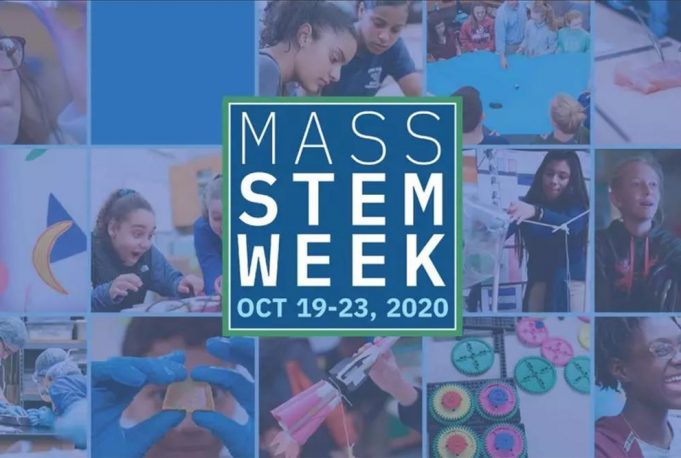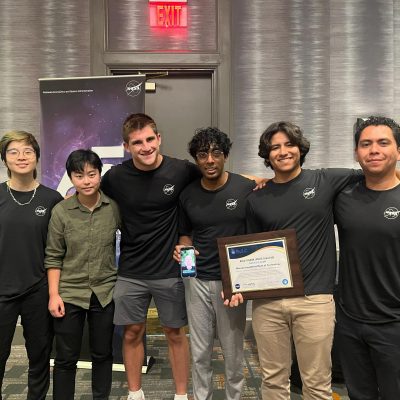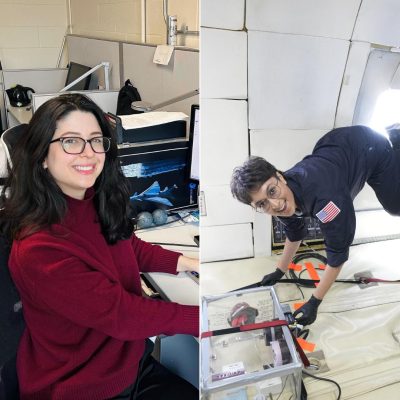
STEM Week event encourages students to see themselves in science and technology careers
Covid-19 has given the public a crash course in what it is like to be a medical researcher. The evening news displays graphs and charts describing case counts and statistical data, while the status of vaccine trials is front page news. Now, more than ever, the public is seeing how STEM (science, technology, engineering, and math) fields are rising to the challenge of Covid-19.
It is in this spirit that MIT and the Massachusetts STEM Advisory Council encouraged students to “see themselves in STEM” by producing a week of programming aimed at fostering a lifelong love of STEM.
Partnering across the Commonwealth
The Massachusetts STEM Week kicked-off Oct. 19 with opening remarks by MIT President L. Rafael Reif. Speaking to a stream of over 480 viewers, President Reif reflected on how reading MIT textbooks in his native Venezuela put him on a pathway to a career in STEM. “I realized there was a world of other people who loved science and engineering, and places like MIT where I could join them,” he said. President Reif challenged students to participate in STEM spaces, declaring “we need you to do more than see yourself in STEM, we invite you to step up and take your place.”
Governor Charlie Baker joined the kickoff event, describing the importance of the Massachusetts STEM economy and its global impact. “Massachusetts is enormously lucky to have MIT among the constellation of amazing colleges and universities that are a part of this Commonwealth,” the governor said, noting that STEM institutions “provide an incredible collection of ideas, gadgets, and solutions that become a big part of the way the world works.”
Lieutenant Governor Karyn Polito, a co-chair of the STEM Advisory Council, echoed those sentiments, adding “with the pipeline of talent we have, we need to make sure that pipeline includes more women and communities of color.” Fellow STEM Advisory Council co-chairs Jeffrey Leiden of Vertex Pharmaceuticals and U.S. Congressman Joe Kennedy also offered inspiring welcoming remarks.
MIT Media Lab Associate Director Cynthia Breazeal presented the kickoff’s keynote address, diving into the number of ways that artificial intelligence permeates the platforms that students frequently utilize. Noting examples of how AI can sometimes encode bias into software, Breazeal argued that the antidote is to prepare students to be “AI-Literate” and encourage them toward the field. Expanding access to open K-12 curriculum, educator resources, and easy-to-use platforms that introduce AI concepts will excite “a far more diverse and inclusive group of students [who] have the potential to become the ethical designers of the AI solutions of tomorrow.”
70 years of supporting student scientists through the Massachusetts Science and Engineering Fair
The second hour of the kickoff event celebrated student scientists by featuring two prize-winning projects from this year’s Massachusetts Science and Engineering Fair (MSEF). MIT’s relationship with MSEF spans over 70 years, starting with a small gathering on the dirt floor of Rockwell Cage in 1949. The fair was started by the American Academy of Arts and Sciences, MIT professors, and a group of pioneering K-12 science educators organized as the Massachusetts Science Fair Committee.
The first two presenters were Hopkinton High School students Archita Nemalikanti and Sreeja Bolla, winners of the Sanofi Genzyme award. Their invention combined light sensors, computer programming, and a heavily researched set of calculations to create a non-invasive test for anemia in newborns, similar to current O2 finger sensors. Archita and Sreeja described the months-long process of developing the device and demonstrated their expertise to an international audience.
Mathworks prize winner and Westfield High School student Suvin Sundararajan presented his work on testing different additives to create safer and more environmentally friendly plastics for 3D printing. His biodegradable, flame retardant, non-toxic plastic was synthesized using lab equipment and guidance from the Emrick Group in the Department of Polymer Science and Engineering at the University of Massachusetts at Amherst. Reflecting on how the group’s mentorship made the project possible, Suvin recounted how he was trained on multimillion-dollar equipment typical in chemistry labs, which “allowed me to understand how they function and provided an opportunity to generate more ideas” for his work.
More #MassSTEMWeek events across campus
In addition to Monday’s kickoff event, members of the MIT community participated in a range of Massachusetts STEM Week events across the Commonwealth.
- Former astronaut and aeronautics and astronautics Professor Jeff Hoffman discussed NASA’s latest Mars mission and the Mars 2020 Perseverance Rover on “AstroNights: LIVE Mars Mania!”
- Professor of comparative media studies Fox Harrell, an affiliate of the MIT Computer Science and Artificial Intelligence Laboratory, participated in a panel discussion with Lt. Governor Polito and four inspiring Boston Public Schools students organized by the United Way’s BoSTEM program.
- Lemelson-MIT held two STEM Week events, “Helping Youth See Themselves in Biotech” and “The Wonderful World of Biotech,” co-sponsored by the Massachusetts Black and Latino Legislative Caucus.
- MIT Media Lab Research Scientist Katlyn Turner presented “Antiracism in Technology Design.”
- The MIT Museum held two Virtual Idea Hubs, which encourage creating, tinkering, and engineering using everyday materials around your home. Participating families built whimsical structures that explored balance and centers of gravity.
- Brian Mernoff, an educator at the MIT Museum, participated in the MetroNorth/Region IV MSEF event. This panel — Supporting Science at Home, featuring MSEF’s Region IV Science Fair representatives — included a robust conversation about supporting students through the science fair process and how university and corporate partners add perspective and value along the way.
In addition to these events, undergraduate students led over 250 hours of hands-on STEM explorations with 60 high school students around the Commonwealth as part of MIT’s Full STEAM Into Fall after-school program.
The Massachusetts STEM Week is organized by the Massachusetts Executive Office of Education and the STEM Advisory Council.

